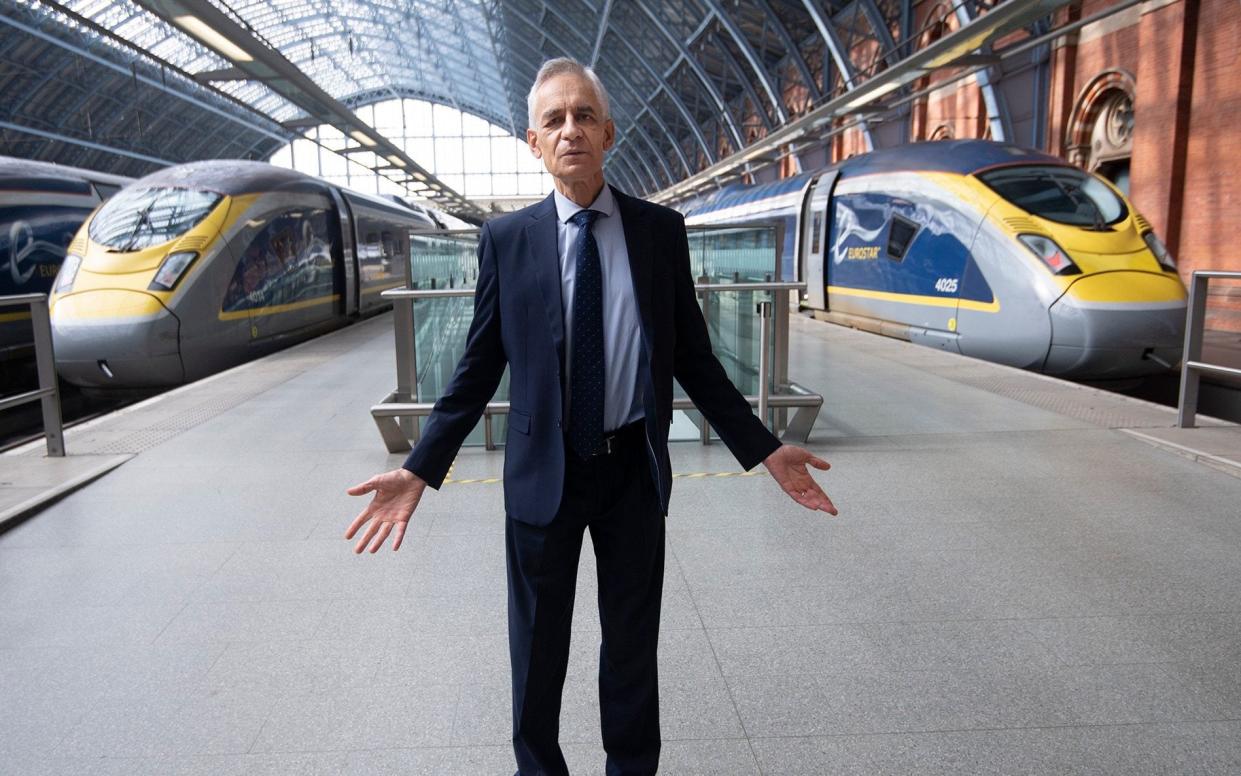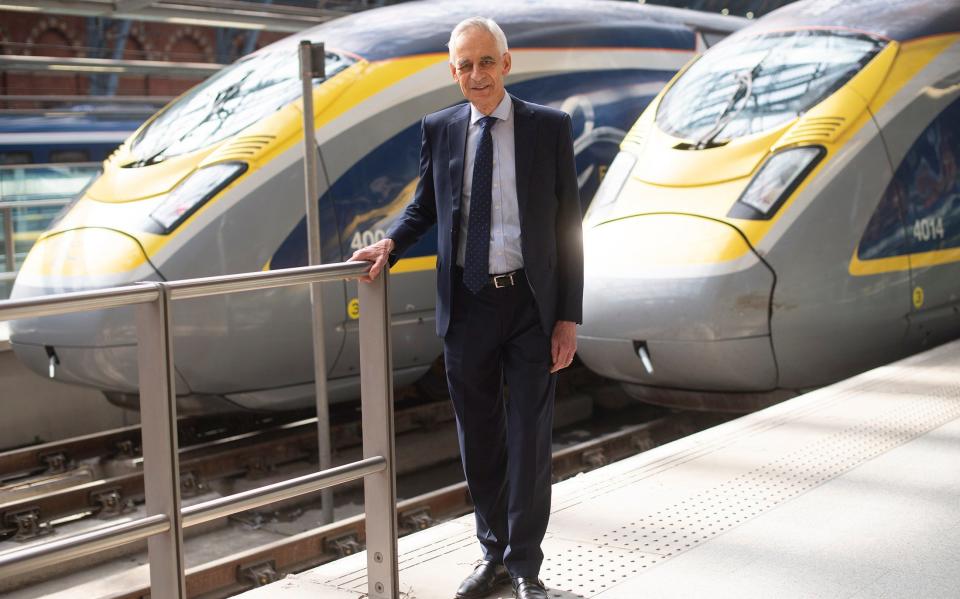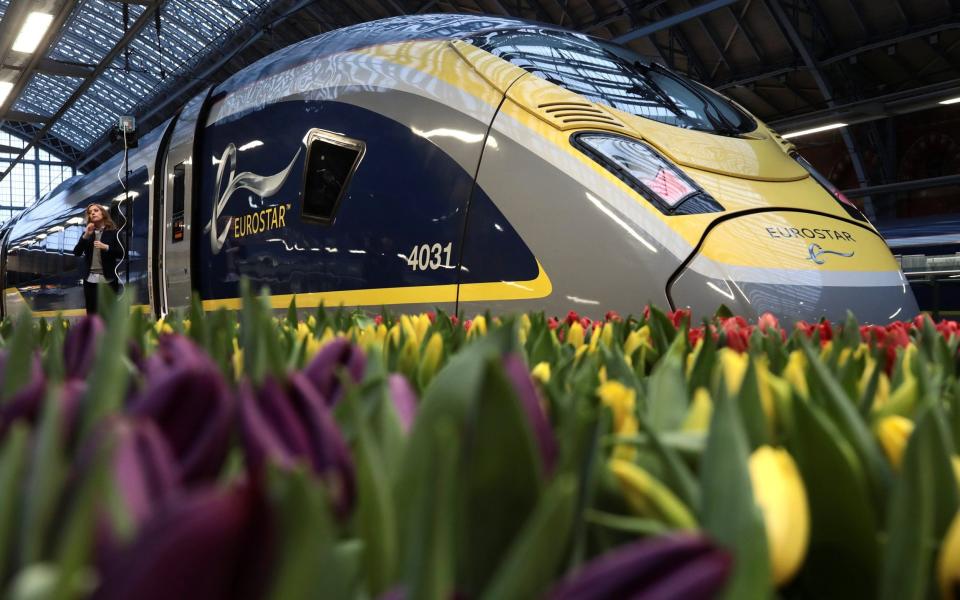Eurostar chief demands airline tax to help save rail link to France

- Oops!Something went wrong.Please try again later.
The boss of Eurostar is calling for an airline tax to subsidise rail services to the Continent in a move that would help Boris Johnson meet his climate change commitments.
Jacques Damas urged the Prime Minister to encourage more Britons to use Eurostar instead of flying to northern Europe.
“If the UK Government wants to commit to its objective for carbon emissions reduction … then they have to activate the right levers," he said. “This high speed [railway] in the world has a lot of remaining capacity.”
The French President, Emmanuel Macron, is cracking down on domestic flights with a ban on services that can be travelled by direct train in less than two-and-a-half hours.
Mr Damas added: “If you do not want to ban, but give an incentive, it is very easy. If you just work with the taxation system. If you take just £1. Take £1 more in taxing fuel for aircraft, and take that £1 as a reduction in access charges on the railway.”
The remarks are likely to anger airlines that have suffered higher rates of air passenger duty compared with their rivals overseas and continue to grapple with the fallout from the aviation industry’s worst crisis.
In a wide-ranging interview with The Telegraph (below), Mr Damas said that the UK’s decision to scrap quarantine for fully vaccinated EU and US citizens would play a key role in Eurostar’s recovery. But this remains in the balance with Britain currently at loggerheads with France of its decision to single it out as the only European country for which a 10-day quarantine will still be required.
The operator secured a £250m rescue from shareholders and lenders in May, but much of the money must be repaid by March.
“The refinancing that we have allows us to feed the company until the end of winter,” he said.
“Not only must this business recover, this business must be able to repay its enormous debt. At the moment, our debt is reaching one year’s worth of revenue. We are approaching €1bn debt.”
Eurostar is only running four services a day compared with up to 25 in normal times.
Mr Damas remains hopeful that Eurostar can merge with Franco-Belgian operator Thalys in the first half of next year. This could lead to Eurostar trains being run between two stations on the Continent for the first time.
Jacques Damas interview: "The important thing is that this business survives"
The irony of Britain’s strict approach towards Covid border controls is not lost on Jacques Damas.
“It is bizarre,” says the Eurostar boss. “Usually the UK people and the UK as a country are known for pragmatism [as] opposed to the Cartesian mindset of French people.”
It was a point he was not afraid to make to Edward Llewellyn, the outgoing French Ambassador, at a crunch meeting last Friday to discuss border policy.
Whitehall sources say that Eurostar bosses were at that point “panicking” about the UK’s stringent rules, which, if prolonged, would put Eurostar back on track for collapse again.
Double-jabbed Britons returning from France still have to quarantine for 10 days when they arrive back, despite the country being on the amber list.
The border regulations are an ongoing headache for Damas, 64, who has led the Eurostar’s fight for survival since being installed as chief executive last October.
The pandemic has laid waste to the business. Passenger numbers have averaged just 5pc of pre-pandemic levels - and some weeks they have been as low as 2pc.
At the start of 2021, Eurostar’s plight morphed from a business crisis to a geopolitical one as the UK Government refused pleas for aid. “It’s not our company to rescue,” said Grant Shapps, Transport Secretary.
Damas, a Morrocan-born Frenchman with almost four decades of experience on the railways, is more philosophical. “I never applied for the job,” he says, with a Gallic shrug of his shoulders.
The Eurostar chief does not carry himself with the pomp associated with many bosses on the Continent. Sitting on a sofa in the near-deserted Eurostar business lounge at St Pancras station, he could be mistaken for an average middle-manager.
He does not wear a watch and his answers are long and winding - whether there is a connection between the two is hard to tell. Either way, for this technocrat, context is everything.
Damas was the natural choice to step into the breach last October after boss Mike Cooper was poached by German-owned bus and rail operator Arriva.
The timing of Cooper’s exit could hardly have been worse. As a second Covid wave rolled across Europe, plans to reopen borders were shelved.
Eurostar was facing a long winter with no income. Worse still, it was a winter that ended with the Channel Tunnel train operator having to repay hundreds of millions of pounds of short-term loans that had been arranged by Cooper before he left.

The “UK lock” at the borders, as Damas puts it, has been “the one stable thing” since he took office. It was for this reason, allied with the fact that in Damas’ eyes Eurostar is primarily British business, that he appealed to the Government for help.
Two-thirds of Eurostar’s 1,300-strong workforce are based in the UK, likewise the operator’s engineering depot and headquarters in King’s Cross.
“There are several countries on the Continent, but there is just one country in the UK,” Damas says. “By definition, by geometry, London is first.”
Shapps’ refusal to rescue Eurostar was in part a result of the bad blood between London and Paris over the terms of Britain’s exit from the EU, according to multiple sources.
As Damas scrambled to secure new funding earlier this year, he even said that he would appeal to the Queen to step in.
“It was not a joke,” he says, pauses, and changes his mind. “Well, it was a bit of a joke. But what is behind it? It is two centuries of history. The first person who thought about a link between England and France was Napoleon Bonaparte.”
When the Channel Tunnel was finally given the go-ahead in 1986, Damas says there were four key people involved: Margaret Thatcher, Francois Mitterand, Jacques Chirac and the Queen.
And therein lies the reason for his appeal to Buckingham Palace “Just one of them is still alive,” Damas explains.
Free-marketers will highlight that the UK took the correct decision. In May, Eurostar secured £250m in emergency funding from its lenders and shareholders - including French state-owned SNCF.
Although Damas admits Britain’s approach was “very severe”, he does not appear to hold a grudge. “The important thing is that this business survives,” he says. “[And] charity from states rarely [comes] without conditions.”
Eurostar’s future still hangs in the balance. “Not only must this business recover, this business must be able to repay its enormous debt.
“At the moment, our debt is reaching one year’s worth of revenue. We are approaching €1bn debt.”
The May rescue is little more than a sticking plaster. Under its terms, hundreds of millions must be repaid next March.
“The refinancing that we have allows us to feed the company until the end of winter,” Damas says. “But we cannot reach that stage. Because if we were to spend all the money by that stage, we would end up with nothing.”
Damas’ remarks come less than 24 hours before the Prime Minister announced on Thursday he would open up Britain’s borders to arrivals from the EU and the US that have been double-jabbed.
While it does not apply to France, the opening up to double-vaccinated passengers is the first half of Damas’ call for “rules and tools” from the UK needed to get Eurostar back to running 15 trains a day to Paris and 10 to Brussels and Amsterdam.
The “tools” will avoid chaos at border point as necessary checks are carried out.
“If you have the rule, but each time you need 10 minutes for one single passenger, it cannot work,” he says. “The point is to show a QR code, and [he claps for dramatic effect] that’s okay. Green.”
The jury is still out on whether the Eurostar project has been a success. In its first year Eurotunnel predicted that 15m people would use the service. By the mid-noughties this was forecast to hit 25m. The operator’s best year to date was in 2019, when it hit 11m passengers.

The service has, however, switched people away from flying over the English Channel. Roughly four out of every five journeys are made on Eurostar.
And with Johnson doggedly driving an ambitious green agenda, Damas says Eurostar, which is an electrified service, can play an important role in the UK meeting its net carbon zero targets.
“If the UK Government wants to commit to its objective for carbon emissions reduction… then they have to activate the right levers,” he says. “This high-speed [railway] in the world has a lot of remaining capacity.”
In France, Emmanuel Macron has imposed a ban on domestic flights where the route can be travelled by direct train in less than two-and-a-half hours.
Damas does not support the idea of a similar ban on airlines flying to destinations served by Eurostar. “If you do not want to ban, but give an incentive, it is very easy,” he says “If you just work with the taxation system. If you take just £1. Take £1 more in taxing fuel for aircraft, and take that £1 as a reduction in access charges on the railway.”
Damas doesn’t have plans to be in the Eurostar job for too long. His role is to “steady the ship” - his main hobby is sailing after all - and identify a long-term successor.
Johnson’s decision to open Britain’s borders to the vaccinated will also pave the way for Eurostar’s merger with French-Belgian operator Thalys, a combination that would double annual revenues to almost €2bn.
Diligence will restart in the autumn, he says, with deal negotiations pencilled into take place between October and December. Damas wants the merger to go to the European Commission in the first quarter of 2022, with a target of completing the transaction before next June. Such plans depend on a resurgence in operations, however.
There is little doubt that Damas is passionate about public transport and the role of the railways in connecting a world that is increasingly sensitive to the green agenda.
He is evidently a worrier. Later the same day, he calls, concerned that he may have in some way insulted the Queen. A highlight of his career was overseeing Her Majesty’s trip on the inaugural high-speed service, he explains.
But his biggest concern appears to be that he does not want the legacy of overseeing Eurostar’s demise. “I just do not imagine that this scenario can happen. It is a zero likelihood scenario,” he says with a yellow lanyard hanging around his neck displaying the strapline "2020 and beyond". Whether that is another irony remains to be seen.

